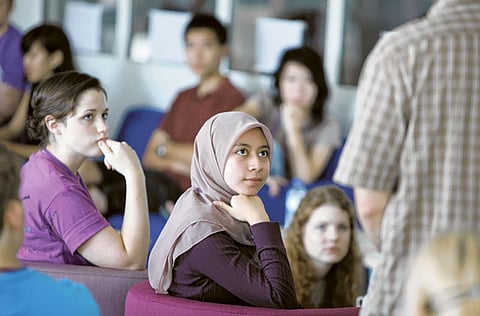US students look to the UAE
Campus Notes explores why increasing number of Americans come to the Emirates

Caren Lynn Crossen came from Michigan, US to study Middle Eastern studies at the American University in Dubai (AUD). She did so to gain insight into the present state of the US' involvement in the Middle East.
"The main reason I chose to study at AUD was to become more knowledgeable about the Middle East, while gaining a historical perspective and ability to understand the present situation that the US is now involved in with the Middle East," said Crossen.
Her initial interest in the region was sparked during the summer of 2006, when media coverage of the Lebanon-Israeli war was widespread across the world.
Having taken a gap year upon finishing school, Crossen was lost when it came to higher education choices.
"Ever since July 2006, I have been extremely interested in anything pertaining to the Middle East," she said. "[When the war started] I knew very little about the regional conflict, but when I began to research more about this area [Middle East] and its history, I knew the direction I wanted my academic career to take, and it pointed East."
Crossen is but one of many US students interested in travelling to the UAE and the Middle East for tertiary education. The UAE ranked third as a favourite destination for US students to pursue higher education, according to a recent report by the Institute of International Education (IIE).
IIE's 2009 Open Doors report shows there were almost 350 US students pursuing tertiary studies in the UAE in the 2007/2008 academic year.
In comparison, almost 1,300 students from the UAE sought university education in the US in the 2008/2009 academic year.
However, the increasing US students' interest in the UAE and the Middle Eastern region at large, academics and students say, may be due to many reasons. They include the state of international affairs, the region's strategic role in the global economy as well as the ongoing media attention directed at the UAE and the region.
A global affair
"There is no question that American students' interest in coming to this part of the world is dictated by international affairs," said Mark Rush, Dean of the College of Arts and Social Sciences at the American University of Sharjah.
"There has also been increasing interest at universities in the US in learning Arabic and studying Middle Eastern affairs," he added.
The prospect of spending part or all of their university years in the UAE is becoming ever more attractive to US students, in part due to the establishment of US universities like New York University Abu Dhabi (NYUAD) and the introduction of Middle Eastern certificate courses at AUD.
"[Increasing US student interest] could be driven by the reaction to 9/11 and the subsequent wars or [driven] by oil and environmentalism," said Rush.
"Students have become acutely aware of the importance of the cost and access to oil and the need to find alternative energy sources. So I think American students studying subjects like international affairs, economics and politics are acutely aware of the importance of this region," he added.
However, Rush said that growing US student interest in the region stems from increasing faculty attention being paid to the region, predating 9/11. "What we've seen as a growing interest in the Middle East spreads across the world, paralleling the same interest we now see in China," said Rush.
Jasmine Boutros, from New York, joined NYUAD's first undergraduate class of 2014 this autumn. What attracted her to pursue her studies in the UAE was the coupling of a top US education with a global hotspot.
"The fact we are in such a global hotspot presents the opportunity of a lifetime. We are receiving a great education and immersing ourselves into a new culture at the same time," she said.
Career opportunities
She added that the growth of the UAE's capital and surrounding emirates seems to hold many potential career opportunities for US undergraduates. "The Middle East is such a key player in the global economy that looking into the future, it seems it would be a great place to engage in international business ventures," added Boutros. "Abu Dhabi is such an up-and-coming city, I feel like right now is the perfect time to be here," she added.
Dr Feras Hamza, Associate Professor of Middle Eastern studies at AUD believes increasing interest in the UAE as a study destination for US students may be a combination of two things, the students' curiosity about the region as well as Dubai and the UAE's heightened international profile.
"Dubai's heightened profile on the international scene is even evident in its being referenced to in Hollywood movies," said Dr Hamza. "[And] most people and students are fascinated by this thing that is Dubai, which makes it convenient to marry one interest with another, creating a base from which to explore the rest of the region," he added.
AUD's certificate in Middle Eastern studies is in its second year and recently admitted just over 30 visiting students — mainly from the US — into the programme.
"The students find this [programme] offers a great package because they can come to Dubai, get a certificate which gives them a well rounded education of the region and culture from an academic perspective," said Peggy Awad, External Relations Manager at AUD.
"[The students'] curiosity to learn about the Middle East and its culture has been heightened mainly because their [US students'] institutions are starting to educate them more about what's out there…and it's through international collaborations with other institutions cultural gaps will be bridged," she added.
Sign up for the Daily Briefing
Get the latest news and updates straight to your inbox



